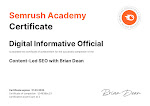Understanding Marketing: A Comprehensive Guide to Success
Understanding Marketing: A Comprehensive Guide to Success
In the ever-evolving world of business, marketing plays a pivotal role in the success of any venture. Marketing is not just about selling products or services; it's a multifaceted discipline that involves strategies, tactics, and creativity to reach and engage with your target audience effectively. In this comprehensive guide, we will delve deep into the world of marketing, exploring its various facets, strategies, and the crucial role it plays in driving businesses forward.
The Essence of Marketing
Marketing is not just a buzzword; it's the lifeblood of any business. It encompasses the activities and processes that a company undertakes to create, communicate, deliver, and exchange value with its customers, clients, partners, and society at large. It's the bridge that connects businesses with their audience, conveying the unique selling proposition, and fostering brand loyalty.
The Key Components of Marketing
Market Research: Before embarking on any marketing campaign, it's essential to understand your target audience thoroughly. Market research involves collecting and analyzing data to gain insights into customer behavior, preferences, and trends. This invaluable information forms the foundation for crafting effective marketing strategies.
Product Development: Your product or service is at the core of your marketing efforts. It should fulfill a need or desire in the market and provide a solution that sets it apart from the competition.
Branding: Creating a strong brand identity is crucial for long-term success. A well-defined brand helps customers recognize and trust your business. It includes elements like logos, taglines, and the overall perception of your company.
Content Marketing: In the digital age, content is king. Producing high-quality, relevant content that resonates with your target audience is essential. This includes blog posts, articles, videos, and social media updates that provide value and engage your audience.
Digital Marketing: With the internet's ubiquity, digital marketing has become a cornerstone of modern marketing strategies. It includes search engine optimization (SEO), pay-per-click advertising, social media marketing, email marketing, and more.
Traditional Marketing: Traditional marketing methods such as print advertising, TV commercials, and direct mail still have their place in the marketing mix, depending on your target audience and goals.
Public Relations: Building and maintaining a positive public image is crucial. Effective PR strategies can help you manage your company's reputation and address any crises that may arise.
The Role of Marketing in Business Growth
Marketing is not just about creating awareness; it's about driving growth and achieving tangible results. Here's how marketing contributes to the success of a business:
1. Customer Acquisition
Effective marketing strategies attract new customers to your business. By identifying your target audience and tailoring your messaging to their needs and desires, you can entice potential customers to choose your products or services over your competitors'.
2. Customer Retention
Marketing is not just about acquiring new customers but also retaining existing ones. Building strong customer relationships through personalized communication and exceptional service can lead to long-term loyalty and repeat business.
3. Brand Recognition
A well-executed marketing campaign elevates your brand's visibility and recognition. When customers recognize and trust your brand, they are more likely to choose it when making purchasing decisions.
4. Market Expansion
Marketing strategies can help your business expand into new markets and reach a wider audience. Whether you're launching in a new region or targeting a different demographic, marketing can pave the way for growth.
5. Competitive Advantage
In a competitive market, effective marketing can give your business a distinct edge. It allows you to highlight your unique selling points and position yourself as a leader in your industry.
Crafting Successful Marketing Strategies
Marketing is not a one-size-fits-all endeavor; it requires tailored strategies that align with your business goals. Here are some key steps to crafting successful marketing strategies:
1. Set Clear Goals
Define your marketing objectives clearly. Whether it's increasing website traffic, boosting sales, or raising brand awareness, having specific goals helps you measure success.
2. Know Your Audience
Understanding your target audience's demographics, preferences, and pain points is essential. This knowledge allows you to create content and campaigns that resonate with them.
3. Choose the Right Channels
Select the most appropriate marketing channels to reach your audience effectively. This could include a combination of social media, email marketing, content marketing, and paid advertising.
4. Monitor and Analyze
Regularly track and analyze the performance of your marketing efforts. Use data and analytics tools to fine-tune your strategies and optimize for better results.
5. Adapt and Evolve
The marketing landscape is constantly changing. Stay adaptable and open to new approaches and technologies to keep your strategies fresh and effective.
Conclusion
Marketing is a dynamic and ever-evolving field that plays a fundamental role in the success of any business. By understanding its key components and crafting tailored strategies, you can harness the power of marketing to drive growth, build brand recognition, and achieve your business goals.






















Post a Comment